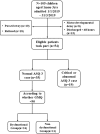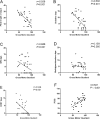Gross motor developmental dysfunctional outcomes in infantile and toddler pediatric intensive care unit survivors
- PMID: 31862006
- PMCID: PMC6925463
- DOI: 10.1186/s12887-019-1893-9
Gross motor developmental dysfunctional outcomes in infantile and toddler pediatric intensive care unit survivors
Abstract
Background: Increasing studies have focused on motor function/dysfunction in PICU survivors; however, most studies have focused on adults and older children. This study investigated gross motor developmental function outcomes in infantile and toddler pediatric intensive care unit (PICU) survivors and the factors associated with gross motor developmental functions.
Methods: This observational study was conducted in the PICU of the First Hospital of Jilin University between January 2019 and March 2019. Thirty-five eligible patients were divided into the dysfunctional (n = 24) or non-dysfunctional (n = 11) group according to the results of the Peabody Developmental Motor Scales, Second Edition (PDMS-2). Baseline gross motor function for all participants before PICU admission was measured via the Age and Stages Questionnaires, Third Edition (ASQ-3). The PDMS-2 was used to evaluate gross motor development function before PICU discharge.
Results: The gross motor developmental dysfunction incidence was 68.6%. Linear correlation analysis showed that the gross motor quotient (GMQ) was positively correlated with the pediatric critical illness score (PCIS, r = 0.621, P < 0.001), and negatively correlated with length of PICU stay (r = - 0.556, P = 0.001), days sedated (r = - 0.602, P < 0.001), days on invasive mechanical ventilation (IMV; r = - 0.686, P < 0.001), and days on continuous renal replacement therapy (CRRT; r = - 0.538, P = 0.001). Linear regression analysis showed that IMV days (β = - 0.736, P = 0.001), sepsis (β = - 18.111, P = 0.003) and PCIS (β = 0.550, P = 0.021) were independent risk factors for gross motor developmental dysfunction.
Conclusions: Gross motor developmental dysfunction in infantile and toddler PICU survivors is more common and may be exacerbated by experiences associated with longer IMV days and increasing illness severity combined with sepsis.
Trial registration: The trial 'Early rehabilitation intervention for critically ill children' has been registered at http://www.chictr.org.cn/showproj.aspx?proj=23132. Registration number: ChiCTR1800020196.
Keywords: Gross motor developmental function; Infant; Mechanical ventilation; Pediatric intensive care unit; Sepsis; Toddler.
Conflict of interest statement
The authors declare that they have no competing interests.
Figures
Similar articles
-
[Clinical study on sepsis in 2 pediatric intensive care units in Beijing].Zhonghua Er Ke Za Zhi. 2012 Mar;50(3):178-83. Zhonghua Er Ke Za Zhi. 2012. PMID: 22801197 Chinese.
-
Outcomes of patients supported by mechanical ventilation and their families two months after discharge from pediatric intensive care unit.Front Pediatr. 2024 Jan 31;12:1333634. doi: 10.3389/fped.2024.1333634. eCollection 2024. Front Pediatr. 2024. PMID: 38362003 Free PMC article.
-
ICU-Acquired Weakness Is Associated With Differences in Clinical Outcomes in Critically Ill Children.Pediatr Crit Care Med. 2016 Jan;17(1):53-7. doi: 10.1097/PCC.0000000000000538. Pediatr Crit Care Med. 2016. PMID: 26492063 Free PMC article.
-
Toddler Developmental Delays After Extensive Hospitalization: Primary Care Practitioner Guidelines.Pediatr Nurs. 2015 Sep-Oct;41(5):236-42. Pediatr Nurs. 2015. PMID: 26665423 Review.
-
Developmental Care in the Early Years in Pediatric Intensive Care Patients as a Strategy to Mitigate Pediatric Post-Intensive-Care Syndrome: A Narrative Review.J Intensive Care Med. 2025 May 13:8850666251340646. doi: 10.1177/08850666251340646. Online ahead of print. J Intensive Care Med. 2025. PMID: 40356557 Review.
Cited by
-
Transitions from short to long-term outcomes in pediatric critical care: considerations for clinical practice.Transl Pediatr. 2021 Oct;10(10):2858-2874. doi: 10.21037/tp-21-61. Transl Pediatr. 2021. PMID: 34765507 Free PMC article. Review.
-
Neurodevelopmental outcomes in children with cyanotic congenital heart disease following open heart surgery.Ann Pediatr Cardiol. 2022 Jan-Feb;15(1):4-12. doi: 10.4103/apc.apc_149_21. Epub 2022 Jun 14. Ann Pediatr Cardiol. 2022. PMID: 35847390 Free PMC article.
-
Long-term follow-up in pediatric intensive care-a narrative review.Front Pediatr. 2024 Jul 1;12:1430581. doi: 10.3389/fped.2024.1430581. eCollection 2024. Front Pediatr. 2024. PMID: 39011062 Free PMC article. Review.
-
Impact of Infant Thoracic Non-cardiac Perioperative Critical Care on Homotopic-Like Corpus Callosum and Forebrain Sub-regional Volumes.Front Pain Res (Lausanne). 2022 Apr 7;3:788903. doi: 10.3389/fpain.2022.788903. eCollection 2022. Front Pain Res (Lausanne). 2022. PMID: 35465294 Free PMC article.
-
Neurodevelopmental and behavioural disorders after perioperative invasive mechanical ventilation in paediatric surgical admissions.Br J Anaesth. 2025 May;134(5):1440-1449. doi: 10.1016/j.bja.2024.12.042. Epub 2025 Mar 13. Br J Anaesth. 2025. PMID: 40087075
References
MeSH terms
Associated data
LinkOut - more resources
Full Text Sources
Medical



